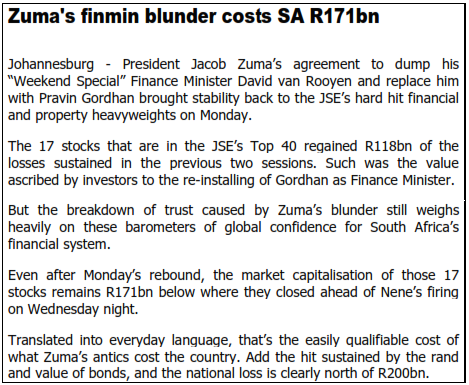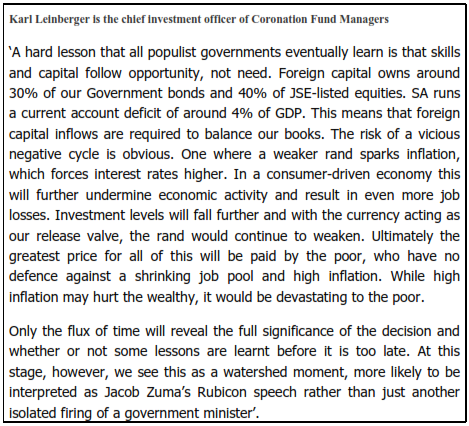CHAPTER 9

South Africa’s rand tumbled to a record low and stocks sank on concern plunging global commodity prices will worsen the country’s economic outlook.
The currency of Africa’s most-industrialized economy weakened to as low 14.0682 against the dollar before trimming losses. South African assets are under pressure as the price of export products from platinum to iron ore retreat and concern mounts that economic growth is slowing in China, its top export destination. Almost 12 stocks fell for every one that gained in Johannesburg, while rand-denominated bond yields jumped to 17-month highs.
“The rand’s getting caned today and it just seems like there’s a lot of fear at the moment,” Michele Santangelo, a money manager at Vunani Private Clients, said by phone from Johannesburg. “The main thing people are doing at the moment is looking to get out of stocks. It’s hard to tell clients to start buying in the face of carnage.”
The South African currency, which plummeted to its all-time low in thin Asia trading, weakened 1.3 percent to 13.1339 as of 6:42 p.m. in Johannesburg. Yields on rand-denominated bonds due December 2026 jumped 21 basis points to 8.53 percent, the highest since March 2014.
The 167-member FTSE/JSE Africa All Share Index declined 2.9 percent 47,631.19; it’s lowest since Dec. 17, paring an earlier decrease of as much as 5.1 percent. The gauge has dropped 4.3 percent this year. Still Overvalued
South African equity markets are still overvalued and will decline further, according to Vaughan Henkel, an investment strategist for Johannesburg-based Stanlib Asset Management Ltd., which oversees the equivalent of $46 billion and has been overweight in cash investments. The All Share Index trades at 17 times estimated earnings compared with 12 for the MSCI Emerging Markets Index.

The obvious question now is whether South Africa can afford to keep such an expensive President?
‘It could certainly do with more of a correction’ he said. ‘We’re watching to see when it’s more fairly valued. We could expect more weakness for a while.’
China’s surprise devaluation of the yuan on August 11 has roiled global markets and reinforced concern of a steep slowdown in the world’s second-largest economy. The Bloomberg Commodity Index, which tracks 22 raw materials, slumped to its lowest level since 1999 on Monday. The rand also dropped to record lows against the euro and British pound.
More Expensive
“The mood isn’t great and people are very nervous,” Ion de Vleeschauwer, chief currency dealer at Bidvest Bank Ltd., said by phone from Johannesburg. “I don’t foresee much activity. People are probably trying to re-adjust their views on where to cost things that they wanted to import from everywhere in the world because now these things are 5 percent to 6 percent more expensive than they were last week.”
Devaluations by Vietnam and Kazakhstan are adding more pressure on central banks from South Africa to Kenya, which has taken aggressive action this year to bolster its shilling. The South African Reserve Bank may consider intervening in foreign exchange markets if financial stability is threatened, the central bank said in a statement on its website on Monday.

Even so, the slide underlines the challenges faced by President Jacob Zuma’s administration in reigniting investment and growth in an economy hampered by an electricity shortage and persistent fiscal and current-account deficits. South Africa faces more than 60,000 job losses this year in industries ranging from mining to aviation, according to a report by the Solidarity labour union.
“It’s a vicious cycle for commodity-related currencies like the rand as weak commodity prices would feed into the weak jobs market, weighing on the economy,” said Tarsicio Tong, a currency trader at Union Bank of Taiwan in Taipei. “It’s hard to see any strong rebound for now.”
I felt that I now had a clearer view of where the South Africa of today stood in relation to the rest of Africa and the world – which was precisely nowhere. Clearly Jacob Zuma already knew this and was selling our soul to the devil in the form Russia and China at a presumably comfortable commission for himself and his cronies.
I mused sadly ‘Well chaps that is just not cricket’.






